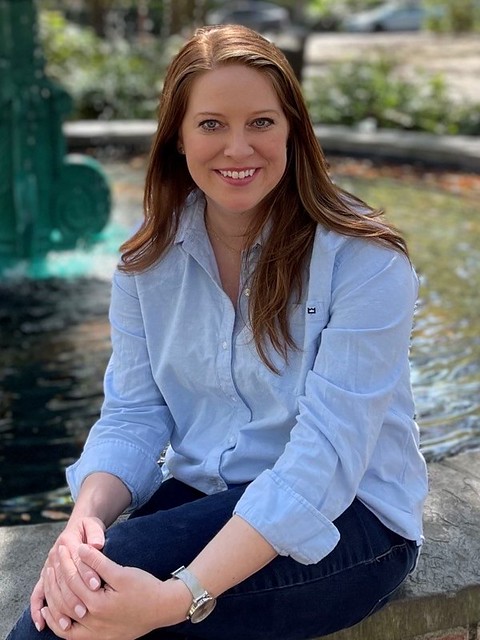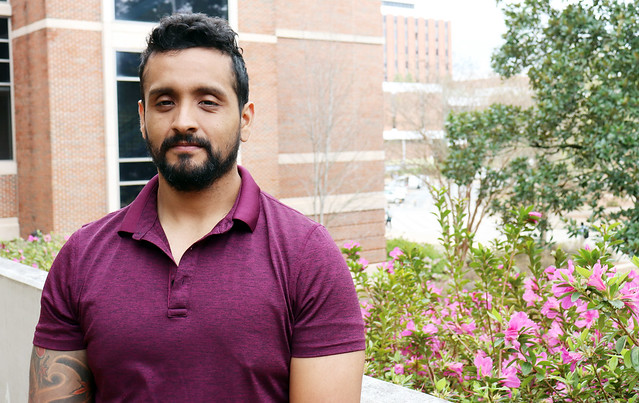Five Auburn graduate students named to state’s largest cohort of Albert Schweitzer Fellows
Article body
Five Auburn University graduate students are part of the 2022-23 class of Albert Schweitzer Fellows, the largest cohort to date for the Albert Schweitzer Fellowship of Alabama.
The class of 20 students, representing fields of medicine, pharmacy, nursing, nutrition science, public health, dentistry and counseling at Auburn and the University of Alabama at Birmingham, will spend 13 months immersed in community public health projects.
Their projects will improve the health and social well-being of their populations of choice throughout the state while simultaneously strengthening their leadership skills. In doing so, they will continue the legacy of the fellowship’s namesake, the famed physician-humanitarian Dr. Albert Schweitzer.
Auburn’s fellows are Chelsea Gayre, College of Nursing; Chigozie “Joi” Chinakwe, Micah Grey and German “Andres” Tovar, Harrison College of Pharmacy; and Jou-Chun “Renee” Pan, College of Education.
“We share in the Albert Schweitzer Fellowship of Alabama’s commitment to meeting the current and future needs of underserved communities through the training of the next generation of medical professionals,” said Hollie C. Cost, assistant vice president for University Outreach and Public Service at Auburn. “We are particularly excited about the unique opportunity this provides our graduate students to develop and implement field-based projects that positively impact these Alabama populations, perpetuating AU Outreach’s commitment to equity.”
Growing up in the small, rural community of Carrollton, Ohio, Gayre developed an interest in rural communities and health care access. Her fellowship project involves implementing telehealth services within primary care offices.
“The goal is to identify disparities in care, identify best practices and implement those for the purpose of testing feasibility of long-term success within the community health centers,” she said. “We hope to close gaps in social determinants of health for those residing in rural communities who are unable to travel for specialty care. I will work with the telehealth platform Vital Engine LLC. and partners at the University of Alabama at Birmingham.”
Gayre currently holds a part-time registered nurse position in the cardiac catheterization lab at Wellstar Health System in Georgia. She received an associate degree and a bachelor’s degree in nursing from Kent State University in Ohio before coming to Auburn for her master’s degree in nursing.
Pan, a first-year master’s student in the clinical rehabilitation counseling program, has a passion for working with youth and emerging adults with disabilities to help them improve their quality of life and support their willingness to break the stigma against disabilities in society.
Her project involves working with young adults with disabilities, including their caregivers, at the BraveHeart Center for Place and Purpose in Auburn to address their special needs by using assistive technology to improve their quality of life. In addition to enhancing youths’ time management, medication management, nutritional awareness and social interaction skills, this health and wellness project aims to support each student in achievin their specific goals for the next chapter of their lives by using a holistic and person-centered approach.
Pan says the ultimate goal will not only encourage a higher level of independence as they transition into a working environment or continue their education, but also provide a channel for the participants to establish self-advocacy, self-determination and empowerment skills.
Chinakwe and Grey, members of the pharmacy Class of 2025, are partners in their project, “Junior Healthcare Leaders of Alabama,” which focuses on providing health literacy and health equity to underserved communities in Macon County, Alabama.
“Being able to give back to Alabama’s underserved communities like those that reflect Macon County, Marengo County and Dallas County has been a passion of mine since attending Tuskegee University,” said Chinakwe. “Being able to carry Dr. Schweitzer’s legacy, teachings and generosity to areas of Alabama where I have not only witnessed but experienced those hardships is so fulfilling.”
To address this issue, Chinakwe and Grey will provide an after-school course to teach students how to manage disease states, prevent negative health outcomes and prepare them for health events that commonly impact Alabamians on a day-to-day basis.
“This fellowship will equip me with the tools needed to successfully plan and run a community service project, geared toward improving health disparities, as well as health literacy in these counties,” said Grey.
For Tovar, a member of the pharmacy Class of 2024, his project, “Substance Use Disorder and its Impact on Adolescent Brain Development,” involves addressing how adolescence is characterized by numerous neurologic changes and increased hormonal production, both impacting behaviors.
Though trends of alcohol, tobacco and marijuana use among adolescents are decreasing nationwide, Tovar notes that trends in Alabama are higher than national averages, making it vital to educate teenagers and prevent the development of substance abuse disorder.
“I found that, by empowering our youth’s agency through knowledge and connection, it will enable them to make better choices with the ultimate goal of improving lives and improving society,” he said. “I feel inspired by the example of past and current fellows and hope that I can add to success of the Albert Schweitzer Fellowship as they have done.”
Schweitzer Fellows work closely under the guidance of community site partners and academic mentors throughout the project period. Gayre is mentored by nursing Professor Linda Gibson-Young. Pan is mentored by Jinhee Park, assistant professor and Clinical Rehabilitation Counseling Program coordinator.
Chinakwe and Grey are mentored by Lawanda Gray, coordinator of school health services with Macon County Public Schools, and Pamela Stamm, associate professor in the Harrison College of Pharmacy’s Department of Pharmacy Practice. Tovar is mentored by Lindsey Hohmann, assistant professor in the Department of Pharmacy Practice.
“The selection of new fellows each year is always a highlight, but this year held special significance due to the over 40 percent growth in the size of our 2022-23 cohort,” said Kristin Boggs, executive director of the Albert Schweitzer Fellowship of Alabama. “As vulnerable populations in our communities face significant obstacles to health and improved quality of life, it is encouraging to see more students rise to the challenge of tackling these issues head-on.
“We are excited to come alongside these students, along with our academic and community-site partners, to channel their ideals and grow their commitment to using their knowledge to affect change for under-resourced communities.”
Upon completion of their fellowship year, the 20 Alabama Schweitzer Fellows and approximately 200 other 2022-23 Schweitzer Fellows from across the United States will become Schweitzer Fellows for Life, joining an active network of Schweitzer alumni continuing their commitment to improving the public health of underserved communities throughout their careers.
Neal Reid, Matt Crouch and Latha Bhavnani contributed to this story.
Related Media
Media interested in this story can contact Communications Director Preston Sparks at (334) 844-9999 or preston.sparks@auburn.edu.
Auburn University is a nationally ranked land grant institution recognized for its commitment to world-class scholarship, interdisciplinary research with an elite, top-tier Carnegie R1 classification, life-changing outreach with Carnegie’s Community Engagement designation and an undergraduate education experience second to none. Auburn is home to more than 30,000 students, and its faculty and research partners collaborate to develop and deliver meaningful scholarship, science and technology-based advancements that meet pressing regional, national and global needs. Auburn’s commitment to active student engagement, professional success and public/private partnership drives a growing reputation for outreach and extension that delivers broad economic, health and societal impact.









